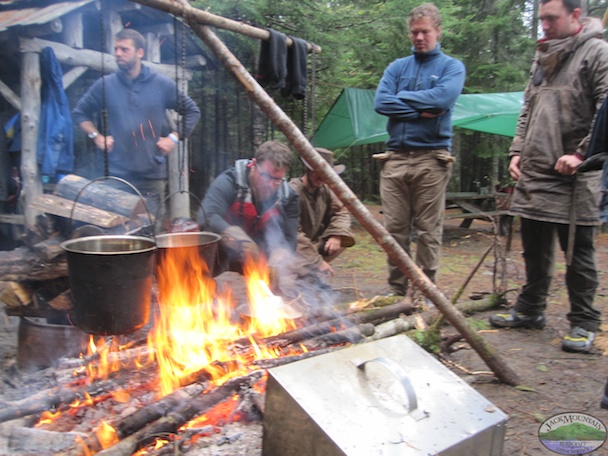We’ve received several calls regarding questions about food and meals on field school courses recently. Our goal is to have no surprises for people when they arrive, but there is a lot of information to digest and while we’re working to simplify it, it isn’t always the easiest to find. I’m posting this information to draw attention to it, but it lives on our Field School Program Information page, which can be accessed from the Course Prep And Gear Lists page accessed under the Registration tab.
We provide no meals during field school courses, but we do provide the staple foods listed below that students can cook for themselves. We believe that learning how to cook, feed and take care of yourself in the bush is one of the most important skill sets to learn. Students should plan to be self-sufficient with regard to food preparation.
There is ongoing instruction covering a variety of outdoor cooking techniques, including cooking over a fire, with a reflector oven, dutch oven, solar oven, fireless cookers, bean holes, fermentation (sauerkraut, kombucha), baking with sourdough, etc., but ultimately it is up to each individual student to make sure their food needs are met. At the beginning of each course we prepare and clean up after meals as a group so that everyone learns our systems for cooking, food storage and dish washing.
Cooking takes place over an open fire, in a solar oven, or on wood-fired rocket stoves. We have an outdoor kitchen and a variety of pots and pans that are available for student use, although bringing a small pot with a lid for personal use is strongly recommended. Food is stored next to the outdoor kitchen in bins and critter-proof containers. We occasionally have porcupines, raccoons and skunks in camp, and we almost alway have squirrels, so we make sure that everything is cleaned up and put away before dark.
While there is a very strong likelihood that we will be sampling a variety of wild foods, we will not be attempting to live off of them.
We encourage students to eat together in order to save fuel and resources. With this in mind students have usually made one-pot meals with the staple foods provided as the main ingredients. During the 20+ past semester courses, some groups of students have opted to cook as a group to share the workload, while others have cooked individually. Both approaches work, and we leave it up to the students to figure out what works best for them.
Plan to bring or purchase any food items not on the staple foods list. As we’re off the grid and don’t have refrigeration, consider bringing a cooler as well for personal perishable items. In lieu of ice, you can use the water from our well to keep food cool – it comes out very cold, even on the hottest summer day. There is a grocery store in Ashland, 9 miles away and several local sources for fresh eggs. There is also a farmer’s market in Presque Isle every Saturday, as well as several large grocery stores.
Staple Foods Provided (Subject to change without notice)
Brown Rice
Rolled Oats
Beans
Lentils
Split Peas
Pasta
Flour (white, unbleached)
Sourdough Starter
Onions
Vegetable Oil
Vinegar
Brown Sugar
Coffee
Black Tea
Baking Powder
Baking Soda
Salt
Black Pepper
Crushed Red Pepper (chili flakes)The majority of foods on this list are the traditional, nonperishable foods of the north woods that people have used for hundreds of years on traplines, to winter over in cabins and to journey through the forest. Supplemented with a few vegetables, some animal fat and the occasional fish or meat, this diet provides ample nutrition for a wilderness lifestyle. That being said, we encourage students to eat whatever diet they choose.
Food On Trips. On trips simple meals based on our staple foods will be cooked as a group. We do not cater to individual preferences, and the food packed is selected with how well it provides fuel for the body and easy of packing in mind. Students are encouraged to bring any snack and supplemental food items they like, but are required to pack them in their individual kit, not in the group food boxes.
In order to help with meal planning, please provide the following information clearly labeled on a piece of paper or in an email:
– List any food allergies you may have. Be specific.
– List any foods you don’t like and can’t or won’t eat.
– List several foods or meals you like and enjoy eating.Please keep in mind that this will be used in meal planning.
Three things to think about with regard to food:
1. Plan ahead. Foods such as whole grains and beans are not convenience foods; they require lengthy periods of soaking and cooking. You’ll need to be organized and plan ahead in order to eat. We have great tools for accomplishing this, including solar ovens, insulated boxes, bean holes, etc., so while there isn’t a lot of work involved, there is a significant amount of lead time.
2. Learn at home. If you’ve never cooked before, learn how to prepare such items as beans and grains at home before you arrive at the field school. Doing so will allow you to experiment where the variables are controllable, and will serve you well when you begin cooking over an open fire.
3. Be self reliant. No one is going to be cooking for you or making sure that you eat. If you wait to the last minute to prepare a meal like many do at home, you’ll probably go hungry. You need to be responsible for your own well being and plan ahead.








